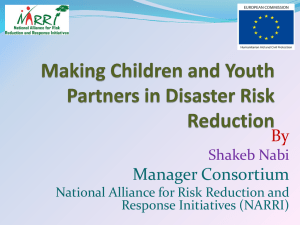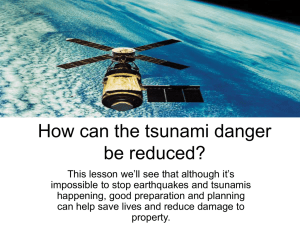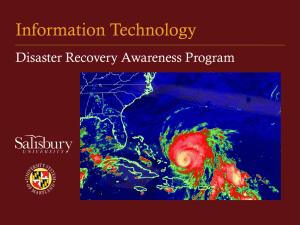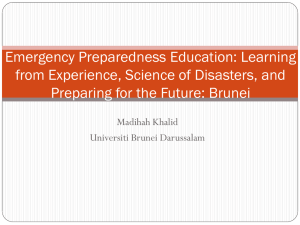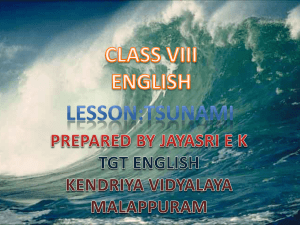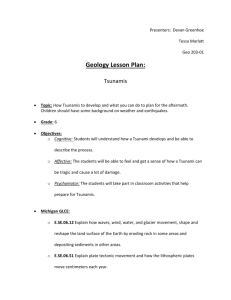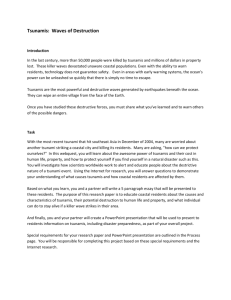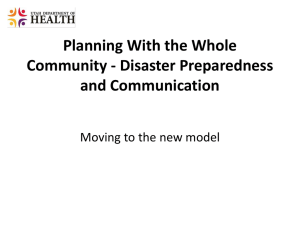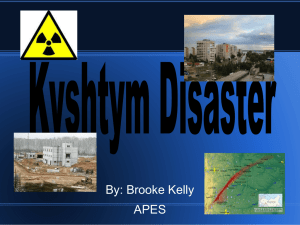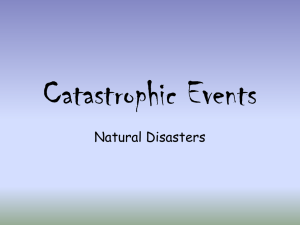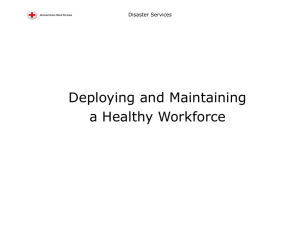視像播放:影像顯示板 - The Chinese University of Hong Kong Library
advertisement
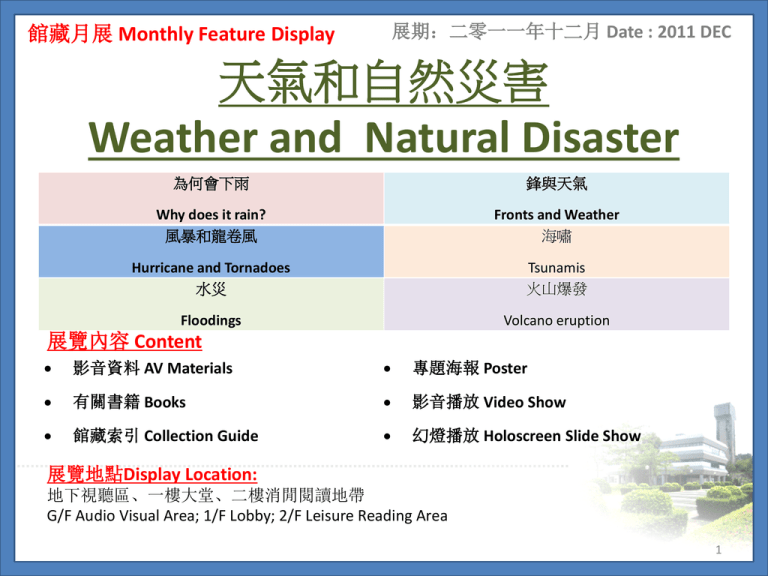
展期:二零一一年十二月 Date : 2011 DEC 館藏月展 Monthly Feature Display 天氣和自然災害 Weather and Natural Disaster 為何會下雨 鋒與天氣 Why does it rain? 風暴和龍卷風 Fronts and Weather 海嘯 Hurricane and Tornadoes 水災 Tsunamis 火山爆發 Floodings Volcano eruption 展覽內容 Content 影音資料 AV Materials 專題海報 Poster 有關書籍 Books 影音播放 Video Show 館藏索引 Collection Guide 幻燈播放 Holoscreen Slide Show 展覽地點Display Location: 地下視聽區、一樓大堂、二樓消閒閱讀地帶 G/F Audio Visual Area; 1/F Lobby; 2/F Leisure Reading Area 1 天氣和自然災害 Weather and Natural Disaster Related Academic Programme in CUHK • Establishment of a BSc degree programme in Environmental Science (ENS) in the 1992/95 triennium. • Jointly offered by the Departments of Biochemistry, Biology and Chemistry. Since the 90's, much effort has been directed towards the protection of the environment and the conservation of natural resources. • The new environmental campaign significantly increases the demand for specialists and technologists to work on various types of environmental problems. [CUHK Environmental Science Programme http://www.cuhk.edu.hk/ens/html/aboutus/aboutens.html] 2 天氣和自然災害 Weather and Natural Disaster What is Weather? • The state of the atmosphere at a specific time and with respect to its effect on life and human activities. • It is the short term variations of the atmosphere, as opposed to the long term, or climatic, changes. • It is often referred to in terms of brightness, cloudiness, humidity, precipitation, temperature, visibility, and wind. [The Weather Channel, LLChttp://www.weather.com/] 3 天氣和自然災害 Weather and Natural Disaster Why does it rain? • On a warm humid day, if we take a bottle of beverage from the refrigerator, we may notice that water will appear on the bottle surface. This is due to the property that cool air holds less moisture than warm air. In this case, water vapour invisible to human eye in the air is cooled on the surface of the bottle. Condensation takes place as the water vapour turns into visible water droplets… Please read the whole article from the post on the G/F display area. 4 天氣和自然災害 Weather and Natural Disaster Fronts and Weather (鋒與天氣) • What is an air mass? • An air mass is defined as a large mass of air with fairly uniform temperature and humidity, or in meteorological term, small temperature and humidity gradients. • What is a front? • A front is defined as the transition zone between two different air masses, where the horizontal gradients of temperature and humidity are relatively large… Please read the whole article from the post on the G/F display area. 5 天氣和自然災害 Weather and Natural Disaster Hurricanes (風暴) • What are Hurricanes? • The terms "hurricane" and "typhoon" are regionally specific names for a strong "tropical cyclone". • A way to think of a hurricane is as a large heat engine. The fuel is moisture from warm ocean water. • The moisture is converted to heat in the thunderstorms that form… Please read the whole article from the post on the G/F display area. 6 天氣和自然災害 Weather and Natural Disaster Hurricanes (風暴) • What are tsunamis? • Tsunamis (pronounced soo-ná-mees), also known as seismic sea waves (mistakenly called “tidal waves”), are a series of enormous waves created by an underwater disturbance such as an earthquake, landslide, volcanic eruption, or meteorite. • A tsunami can move hundreds of miles per hour in the open ocean and smash into land with waves as high as 100 feet or more… Please read the whole article from the post on the G/F display area. 7 天氣和自然災害 Weather and Natural Disaster Tsunamis (海嘯) • What are tsunamis? • Tsunamis (pronounced soo-ná-mees), also known as seismic sea waves (mistakenly called “tidal waves”), are a series of enormous waves created by an underwater disturbance such as an earthquake, landslide, volcanic eruption, or meteorite. • A tsunami can move hundreds of miles per hour in the open ocean and smash into land with waves as high as 100 feet or more… Please read the whole article from the post on the G/F display area. 8 天氣和自然災害 Weather and Natural Disaster Volcano Eruptions (火山爆發) • What are Volcano Eruptions? • A volcano is a vent through which molten rock escapes to the earth's surface. • Unlike other mountains, which are pushed up from below, volcanoes are built by surface accumulation of their eruptive products - layers of lava, ashflows, and ash. • When pressure from gases within the molten rock becomes too great, an eruption occurs. • Volcanic hazards include gases, lava and pyroclastic flows, landslides, earthquakes, and explosive eruptions... Please read the whole article from the post on the G/F display area. 9 天氣和自然災害 Weather and Natural Disaster Floodings (水災) • What are Floodings? • A flood occurs when water overflows or inundates land that's normally dry. • This can happen in a multitude of ways. • Most common is when rivers or streams overflow their banks. • Excessive rain, a ruptured dam or levee, rapid ice melting in the mountains, or even an unfortunately placed beaver dam can overwhelm a river and send it spreading over the adjacent land, called a floodplain… Please read the whole article from the post on the G/F display area. 10 天氣和自然災害 Weather and Natural Disaster References AOML. FAQ: Hurricans, typhoons, and tropical cyclones. http://www.aoml.noaa.gov/hrd/tcfaq/tcfaqHED.html Centers for Disease Control and Prevention. Tornadoes. http://www.bt.cdc.gov/disasters/tornadoes/ Flood Risk Assessment. http://www.floodrisk.co.uk/ Hong Kong Observatory. http://www.hko.gov.hk/ International Tsunami Information Center. Tsunami Risk Zones.http://itic.iocunesco.org/index.php?option=com_content&view=category&layout=blog&id=1166&Itemid= 1166&lang=en National Disaster Education Coalition, Washington, 1999. Talking about disaster: Guide for standard messages. http://www.disastercenter.com/guide/volcano.html Ocracle ThinkQuest. Forces of Nature. http://library.thinkquest.org/C003603/english/tornadoes/casestudies.shtml ProjectArcix: Case study of Mount Saint Helens http://www.projectarcix.com/lite/naturaldisasters/volcano/casestudy.html Scholastic.com. Tornadoes. http://teacher.scholastic.com/ Texas A&M University, OceanWorld. Tsunami. http://oceanworld.tamu.edu/resources/oceanography-book/tsunamis.htm The Weather Channel. http://www.weather.com/ Weather Wiz Kids®. Hurricane. www.weatherwizkids.com/weather-hurricane.htm 台灣中央氣象局. 地震百問Knowledge. http://scman.cwb.gov.tw/eqv5/eq100/100/064.htm 11
